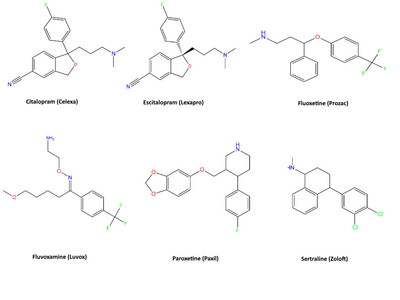Selective serotonin reuptake inhibitor
This page has not been fully approved by the PsychonautWiki administrators. It may contain incorrect information, particularly with respect to dosage, duration, subjective effects, toxicity and other risks. It may also not meet PW style and grammar standards. |
Selective serotonin reuptake inhibitors also known as SSRIs are a class of psychoactive drugs that are commonly used to treat major depressive disorder as well as anxiety disorders. While the precise mechanism of action of SSRIs is unknown, they are believed to increase the extracellular level of serotonin, leading to increased mood. Because SSRIs increase the levels of serotonin, they can be dangerous when used in combination with other drugs that increase serotonin such as MDMA and monoamine oxidase inhibitors. If SSRIs are used with these drugs, it could potentially lead to serotonin syndrome which can be fatal.

Mechanism of action
SSRIs primarily work by inhibiting the serotonin transporter protein which leads to an increased level of serotonin, leading to downregulation of the receptor. SSRIs also lead to an increased level of cAMP (cyclic adenosine monophosphate), brain-derived neurotrophic factor, and several other regulatory neuromodulators. Different SSRIs have different binding profiles, which may lead to different effects.[1]
Specific SSRIs
See also
External links
References
- ↑ Kolb, Bryan and Wishaw Ian. An Introduction to Brain and Behavior. New York: Worth Publishers 2006, Print.